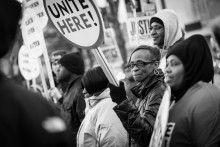OPINION: White students: Get a clue, it’s not always about you
November 21, 2015
On Nov. 12, a demonstration was held in Central’s SURC in support of the Black Lives Matter movement.
During the course of this demonstration, I talked to several people—scratch that—I talked to a LOT of people who put down the protesters for “going about it the wrong way.” I can’t help but disagree with that notion.
Before I dissect this viewpoint, I have to say that I am thankful that these people went out of their way to disclose their thoughts to me. Just because I disagree with them, I have no intention of belittling or shaming them.
This is an attempt to have a discussion in which we can take a moment to step back from our biases and hear the oppressed speak.
Every person that expressed these opinions was a white university student and, let’s be real here, white college kids don’t have any business telling people of color how to act.
I spoke with a group of guys who seemed to agree that the use of profanity and “aggression” was inappropriate to the demonstrators’ cause. They went on to describe what they perceived as a double standard in athletic dialogue.
An interviewee who wished to stay anonymous asked, “Why’s it okay for them to say white people can’t jump?”
Even assuming that this happens frequently enough to complain about, this experience pales in comparison to black Central student Evelyn Briscoe’s experience.
While she was walking home from work at the local Fred Meyer, a truck full of men followed her for three blocks, calling out racial slurs.
Seething with fury and hurt, screaming at the top of her lungs, Briscoe said, “[They called] me a n—-r, a f—ing monkey, calling me all types of names. I have not been the same since.”
Now, I’m sorry that I had to call out those guys at the demonstration, but if you’re reading this, I have to ask you to take a moment to reflect on this so-called double standard.
Did the phrase “white boys can’t jump” cause you enough emotional trauma that made it worthwhile to tell your story to hundreds of your Central peers? If somebody told you that your ethnicity makes you a slower runner, would it make you feel afraid for your life?
Comparing racism in this way is belittling, and this line of thinking is obviously the result of a knee-jerk reaction. You didn’t even bother to ask yourself why the demonstrators were angry, and you refused to acknowledge the fact that people are suffering.
Instead, you just made the issue about yourself.
A few passersby and disgruntled diners agreed that the demonstrators’ purpose was unclear and that they lacked a cohesive goal.
I believe the quote was “this is stupid.”
Well, you heard them, right? Do you understand that they’re angry and tired of being treated like second-class citizens?
Goal number one, according to the organizers of the demonstration, was to make their presence and their problems known to the majority.
They certainly accomplished that goal.
The demonstrators exceeded their own expectations when President Gaudino pledged, in front of hundreds of people, that he would personally write a letter to the University of Missouri that declares Central Washington University as an ally to those in Missouri who suffer from racism.
He also agreed to personally engage with minority groups on campus to achieve a standard of equality on campus.
What’s more, Gaudino agreed that he would resign from his position if he failed to meet the demonstrators’ demands.
If that’s the result of “going about it the wrong way,” then maybe I don’t know what success means.
Finally, I’d like to take a look at the whole All Lives Matter (ALM) versus Black Lives Matter (BLM) debate because, apparently (I’m talking to you, White America) you’re not getting it.
Nobody is saying that a black person matters more than you, and you should know that. So get over it and stop trying to make this about you.
BLM addresses the fact that it is unfathomably more difficult for a person of color to navigate their lives with safety and prosperity.
Yet, it seems like many people can’t help but compare their problems against another’s. ALM dilutes the message that BLM addresses and, in doing so, ALM veils racism and oppression from the majority.
BLM shows us that the oppressed have collectively refused to remain invisible. It reminds us that we live in a world that is brutal and ugly for a lot of people, and the least that you can do is listen to their version of the story.


c rhinehart • Nov 25, 2015 at 3:18 pm
THANK YOU for saying this. It should be mandatory reading. People who think the focus should be ALM are ignoring that the need for the BLM movement is the incredible disparity in how black people in this country are treated by the police, justice system, etc. My family was on campus for the prospective freshman tour and have concerns about our African American son’s safety in Ellensburg that we are trying to evaluate. Its helpful that there is conversation happening on campus and that the President is paying attention to, but what action will result, both on and off campus…..